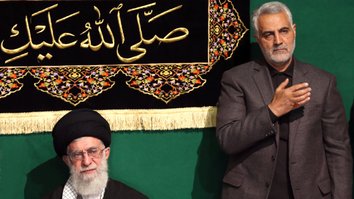Pro-Iran media outlets have been engaged in a campaign to burnish the image and reputation of Maj. Gen. Qasem Soleimani, commander of the Quds Force of Iran's Islamic Revolutionary Guard Corps (IRGC).
These reports have vaunted Soleimani's political and military prowess, even though his decisions and actions have greatly contributed to Iran's isolation and the imposition of sanctions that have devastated its economy, observers say.
They come amid a rising climate of dissatisfaction and criticism inside Iran of Soleimani's performance of his duties outside the country.
Leaders of Iran's reformist movement and hardliners alike are said to be disturbed by the way the IRGC's leadership has been handling foreign affairs, saying this exposes their country to further isolation and economic crises.
![Soleimani seen here with Iranian Supreme Leader Ali Khamenei in October. [File]](/cnmi_st/images/2019/12/02/21136-together-585_329.jpg)
Soleimani seen here with Iranian Supreme Leader Ali Khamenei in October. [File]
In a message aired on state TV, Iran's Supreme Leader Ali Khamenei earlier this year called the economic difficulties Iranians are facing the main and most urgent problem of the country.
Meanwhile, Soleimani has been accused of stoking resentment in Iraq towards Iran because of its support for certain Iraqi militias.
And Iranian politicians have expressed mistrust in field reports Soleimani sends to senior officials, which they describe as "misleading" and based upon "a wrong strategy".
Soleimani's actions also sparked ire among the Iranian people following the IRGC's widely unpopular decision to bring in Iran-aligned Iraqi militias to help it suppress dissent in flood-afflicted areas over the summer.
'Inflated media image'
"Soleimani's inflated media image is not commensurate with his political and military capabilities," said Iranian dissident writer and political analyst Ali Narimani.
The recent media focus on Soleimani is intentional, he noted, as evidenced by the heavy coverage of his presence in Iraq and Syria.
Photos of his visits to these areas were clearly staged for publicity purposes, he said, "but made to appear as though they were taken spontaneously during visits to Lebanese, Iraqi, Afghan, Pakistani and Syrian militia fighters".
These photos portray him in a flattering light -- as the leader of the IRGC abroad, with total control over the forces under his command, he said.
In reality, however, Soleimani's activity consists of directing armed groups who operate more like "gangs" and carry out specific operations, "taking advantage of the turmoil in the countries in which they operate", Narimani said.
They sow discord in neighbouring countries and threaten their security, he said, pointing out that their actions keep Iran "at war with its Gulf neighbours".
The actions of Soleimani's Quds Force "have brought sanctions upon Iran and the Iranian people that have made the social and economic situation more difficult", he added.
A deficiency of leadership
"Soleimani had a modest regular and military education that is not at all commensurate with the image projected of him," said Iranian dissident and Tehran native Hossein Shayan.
This is reflected in the "bellicose and provocative" language Soleimani uses when addressing the IRGC's affiliates and proxies, Shayan said.
"Since his emergence on the regional scene, and despite his command of the IRGC's proxies in neighbouring countries, Soleimani lacks negotiating skills," he added.
"During crises, he mostly inflames the political and military situation, when in most cases what is urgently needed is diplomacy and de-escalation," he said.
Soleimani is not the mastermind he is portrayed to be, as the foreign operations he oversees are in implementation of Khamenei's agenda, said Iranian affairs researcher Fathi al-Sayed.
Neither is he the architect of the programme of expansion he is carrying out in the region in implementation of Khamenei's plans, as the foundations for this were laid out by his predecessor, Gen. Ahmed Vahidi, he noted.

![Quds Force commander Maj. Gen. Qasem Soleimani seen here attending an event in Tehran in August to honor those killed in battle in Syria. [File]](/cnmi_st/images/2019/12/02/21135-soleimani-585_329.jpg)







sulaimani is the killer of thousand of suni people in iraq and Afghanistan . America also the killer of suni both America and Iran are killers of all muslim in Afghanistan , iraq and suriah
Reply5 Comment
If Imam al-Zaman returns too, he will firstly fight with Mullas and Akhunds. In fact, all the vices and debaucheries, religious innovation and destruction of religion originate from Islamic governments. Imam al-Zaman will come soon and will behead the fanatic and dictator Mullas and Akhunds. No infidel has inflicted the blow on the religion as much as Iran did. Iran made Muslims infidels and defamed the name of Islam. Islam was the religion of tranquility and kindness, not the religion of war and violence, killing and oppression. Never forget that.
Reply5 Comment
The world is on the verge of the final transformation of the triumph of light over darkness, and what we witness in the world is the apocalyptic events that mark humanity's final culmination. The United States and Israel seek to establish a Sunni region in western Iraq to keep Israel safe but in the end, whatever the God wills will happen.
Reply5 Comment
Death to America and its spies; long live with Islamic Republic of Iran.
Reply5 Comment
I also hate this Iranian beast. He caused killing of many Afghans in Syria; however, his work is not limited only to Syria. The media reports show that he and in general the [Revolutionary] Guard's group have mercenaries in Afghanistan similar to those they have in Syria and that they are killing Afghans.
Reply5 Comment